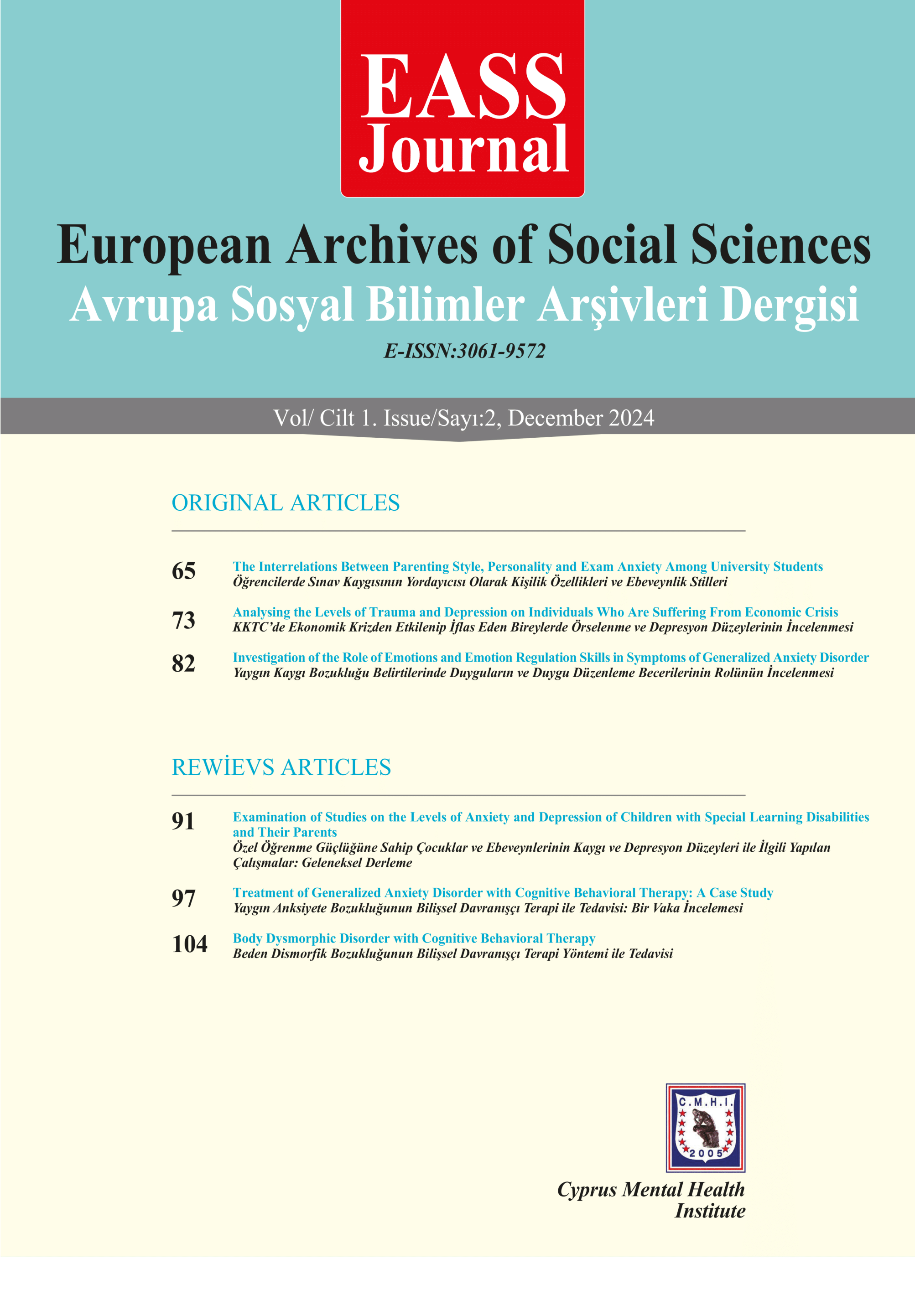Öğrencilerde Sınav Kaygısının Yordayıcısı Olarak Kişilik Özellikleri ve Ebeveynlik Stilleri
DOI:
https://doi.org/10.35365/eass.24.2.01Anahtar Kelimeler:
sınav kaygısı, , kişilik özellikleri, ebeveyn-çocuk ilişkileri, ebeveynlik stilleri, akademik performans, üniversite öğrencileriÖzet
Sınav endişesi öğrencilerin akademik performansını ve gelecekteki yollarını etkileyen önemli bir faktördür. Bu çalışmanın amacı, kişilik özellikleri, ebeveynlik tarzları ve öğrencilerin sınav endişeleri arasındaki ilişkiyi incelemekti. İgbariam Nijerya'dan 400 öğrenciye uygunluk örnekleme tekniği kullanılarak anket yapıldı. Çalışmada üç alet kullanıldı; Kişilik inventörü ölçeği, ebeveynlik tarzı inventörlüğü ve muayene anksiyete ölçeğidir. Sonuçlar, hem ebeveynlik tarzlarının hem de kişilik özelliklerinin sınav endişesini öngördüğünü gösteriyor. Daha düşük deneyim açılımı ve vicdanlılık yanı sıra daha yüksek ekstraversyon, hoşgörü ve nörotizm, test endişesinin artmasını öngörüyor. Tecrübeye açıklık ve vicdanlılık, yaratıcılık uyarılabilirliği, kendi disiplini ve verimliliği ile ilişkilidir. Bu da sınav hazırlığı ve sınav bilgisini artırır. Diğer taraftan, yüksek ebeveyn tepki ve talep gücü olan ebeveyni tarzları; ve daha düşük bağımsızlık vererek daha yüksek sınav endişesi öngörüldü. Ders malzemelerine erişim ve dış öğrenme kaynaklarının kullanımı, sınav endişelerini azaltmakla ilişkilendirildi. Ebeveynlik tarzları ve çocukların kişilik özellikleri karşılıklı bir sebep ilişkisi olduğu ortaya çıktı. Çalışma, öğrenmenin daha fazla öğrenci odaklı olmasının, daha az sınav endişesi ve daha iyi akademik performansla bağlantılı olan öğrenci katılımını artırması gerektiğini öne sürüyor.
Referanslar
References
Alghamdi, A. R. (2016). Test anxiety: Concept and implication. IOSR Journal of Nursing and Health Sciences, 3(3), 112-113. doi: 10.9790/1959-050303112115
Asghari, A., Kadir, R. A., Elias, H., & Baba, M. (2012). Test anxiety and its related concepts: A brief review. Educational Sciences and Psychology, 3(22), 3-8
Boulton, M. J. &Macaulay, P. J. R. (2022). Parenting about challenges and adolescents' social anxiety, disrupted classroom concentration, and resilience knowledge: The mediating role of authentic self-esteem. National Library of Medicine/PubMed, 40(3):332-342. doi: 10.1037/fsh0000701
Cassady, J. C., & Johnson, R. E. (2018). Cognitive test anxiety and academic performance. Contemporary Educational Psychology, 53, 123-133. https://doi.org/10.1006/ceps.2001.1094
Cavanagh, S. R., Spence, S. H., & Donovan, C. L. (2017). The development of a measure of the neurobiological underpinnings of test anxiety: The Test Anxiety Inventory for Neurobiological Substrates (TAI-NS). Personality and Individual Differences, 104, 59-64.
Costa, P. T., & McCrae, R. R. (2012). Revised NEO Personality Inventory (NEO-PI-R) and NEO Five-Factor Inventory (NEO-FFI) professional manual. Psychological Assessment Resources
Darling N., Toyokawa T. (1997). Construction and validation of the parenting style inventory II (PSI-II). Available online at http://www.oberlin.edu/faculty/ndarling/lab/psiii.pdf
Deighton, J., Humphrey, N., Belsky, J., Boehnke, J., Vostanis, P & Patalay, P. (2018). Longitudinal pathways between mental health difficulties and academic performance during middle childhood and early adolescence. British Journal of Developmental Psychology, 36(1), 110–126. doi: 10.1111/bjdp.12218
Del Aguila, E., Martínez, J.R., Pablos, J.L., Huánuco, M., Encina, V., & Rhenals, A.L. (2020). personality traits, anxiety, and self-esteem in patients seeking cosmetic surgery in Mexico city. Plastic and Reconstructive Surgery Global Open, 7(10), doi: 10.1097/GOX.0000000000002381
Evans, D., Gaysina, D. & Field, A. P. (2020). Internalizing symptoms and working memory as predictors of mathematical attainment trajectories across the primary-secondary education transition. Royal Society Open Science, 7(5), 191-433. doi: 10.1098/rsos.191433
Gramstad, T.O., Gjestad, R., & Haver, B. (2020). Personality traits predict job stress, depression and anxiety among junior physicians. BMC Medical Education, 13, 150-150
Hale, W.W 3rd, Engels R, Meeus W. (2006). Adolescent's perceptions of parenting behaviours and its relationship to adolescent Generalized Anxiety Disorder symptoms. J Adolescent, 29(3):407-17. doi: 10.1016/j
Holochwost, S. J., Volpe, V. V., Iruka, I. U., & Mills-Koonce, W. R. (2020). Maternal warmth, intrusiveness, and executive functions in early childhood: Tracing developmental processes among African American children. Early Child Development and Care, 190(2), 210-218. https://doi.org/10.1080/03004430.2018.1461096
Kjeldsen, A., Nes, R. B., Sanson, A., Ystrom, E. & Karevold, E. B. (2021). Understanding trajectories of externalizing problems: Stability and emergence of risk factors from infancy to middle adolescence. Development and Psychopathology, 33(1), 264-283. doi: 10.1017/S0954579419001755.
Kukso, O., & Kukso, P. A. (2022). Characteristics of physiological indicators and individual personality characteristics of students under exam stress. Psychology and Psychothecnics, 1(2), 54-68. doi: 10.7256/2454-0722.2022.2.36529
Latas, M., Pantić, M., & Obradović, D. (2010). Analysis of test anxiety in medical students. Med Pregl, 63(11-12):863-866. doi: 10.2298/mpns1012863l.
Lim, R. P. & Ortiz-bance, L. (2013). Personality Traits as Predictors of Test Anxiety Level of Students with Learning Difficulties. The Trinitian Researcher, 5(1).
McCrae, R. R., & Costa, P.T. Jr. (1997). Personality trait structure as a human universal. American Psychologist. 52(5), 509-516. doi: 10.1037//0003-066x.52.5.509
Olanrewaju, M. & Adeoye, H. (2020) Influence of gender and mode of study on examination anxiety among University undergraduates of Ogun State. Integrity Journal of Education and Training, 2(3) 15-20 https://doi.org/10.31248/IJET2018.026
Saunders, M., Lewis, P. & Thornhill, A. (2012). Research Methods for Business Students (6th ed.). Pearson Education Limited
Sawka-Miller, K.D. (2011). Test Anxiety. In: Goldstein, S., Naglieri, J.A. (eds) Encyclopedia of Child Behavior and Development. Springer, https://doi.org/10.1007/978-0-387-79061-9_2890
Shete, A., Shete, A., Dube, S., & Dubewar, A. (2020). Sample size calculation in bio-statistics with special reference to unknown population. International Journal for Innovative Research in Multidisciplinary Field, 6(7), 236-238. https://www.ijirmf.com/wpcontent/uploads/IJIRMF202007001.pd
Spielberger, C. D. (1980). The Test Anxiety Inventory. Consulting Psychologist Press Inc
Srivastava, S. (2008) Measuring the Big Five Personality Factors. Available online at http://www.uoregon.edu/~sanjay/bigfive.html
Theobald, M., Breitwieser, J., Brod, G. (2022). Test Anxiety Does Not Predict Exam Performance When Knowledge Is Controlled For: Strong Evidence Against the Interference Hypothesis of Test Anxiety. Psychology Sci, 33(12):2073-2083. doi: 10.1177/09567976221119391
Van Schie, C., Cook, J. L., Bernet, E., & Verena, L. (2023). A boost in self-esteem after positive social evaluation predicts social and non-social learning. R. Soc. Open Sci, 10. Doi.org/10.1098/rsos.230027
İndir
Yayınlanmış
Nasıl Atıf Yapılır
Sayı
Bölüm
Lisans
Telif Hakkı (c) 2024 CHINWEDU ENECHI, Gloria Manyeruke

Bu çalışma Creative Commons Attribution 4.0 International License ile lisanslanmıştır.





 Dergimizde yayımlanan makaleler,
Dergimizde yayımlanan makaleler, 